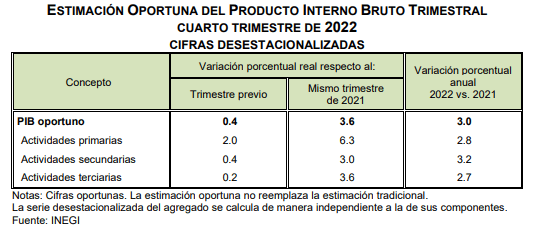Mexico‘s GDP registered a 3% year-on-year growth in 2022, according to timely figures and seasonally adjusted series, Inegi reported on Tuesday.
Previously, the Mexican economy experienced a sharp slowdown starting in mid-2018, followed by a slight contraction of real GDP in 2019 due in particular to a fall in gross capital formation, a reduction in public spending and a slowdown in private consumption.

In 2020, the economy was severely affected by the negative effects of the Covid-19 pandemic, leading to a GDP contraction of 8.2% in 2020.
The following year, in 2021, the Mexican economy rebounded, with a GDP expansion in the order of 4.8%, reflecting in large part the effect of the measures adopted to deal with the pandemic, which were oriented to attend mainly to the most affected families and businesses, particularly small and medium-sized enterprises.
These measures included the opening of facilities to provide an adequate level of liquidity, incentives for the restructuring of bank loans, and the implementation of social programs and business support programs, such as the Financial Support Program for Family Microenterprises.
Mexico: GDP
With the exception of measures to address the pandemic, Mexican fiscal policy continued to be restrictive in order to keep the fiscal balance under control.
In November 2019, the Republican Austerity Law was approved, which aims to contribute to the sound management of public resources, focusing mainly on reducing non-priority current spending.
The Federal Government introduced en 2020 fiscal measures to minimize the effects of the Covid-19 pandemic on health and the economy, for an estimated amount equivalent to 2% of GDP.
In addition, spending cuts were enacted, with the exception of priority programs.
In general, the Mexican federal government’s finances showed an improvement between 2018 and 2019, when a deficit of around 2% of GDP was recorded.
With the Republican Austerity Law, an attempt was made to reduce the deficit; however, as a result of the economic recession caused by the pandemic, there was a deterioration in revenue collection and an increase in spending (albeit moderate).
The federal government deficit rose to 2.5% and 3.1% of GDP in 2020 and 2021, respectively.
Total public sector net debt has remained at moderate levels, and in December 2021 represented 46.3% of GDP.
